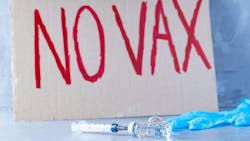Surcharges for Unvaccinated Workers Gain Momentum
First came incentives like gift cards and other forms of direct payment. Now some employers are considering increasing health insurance contribution costs for workers who chose not to get the COVID-19 vaccine.
The idea is not so much a consideration of last resort for employers as it is a potential way for those who have dangled incentives — or for those who have stayed "on the sidelines" as it pertains to COVID-19 vaccinations — to boost workplace health and safety. It also may be an alternative to a vaccination mandate, says Wade Symons, partner at Mercer, an HR consulting firm.
"My perspective is that employers are trying to do more to move that needle," Symons said, "and we've seen that what they've been doing gets you to a certain point, but vaccine levels are not where employers would have expected and wanted them to be, especially in some of those sectors where you have to have employees on the ground."
From an administrative perspective, vaccination surcharges are comparable to tobacco surcharges, Symons continued. Employees who smoke have the potential to drive higher costs to the employer's health plan, as do unvaccinated employees, or so the thinking goes.
Workplace safety is also a consideration. Whereas tobacco use mainly presents as a health problem for individual employees outside of the effects of secondhand smoke, vaccination can impact others in the workplace, Symons said.
